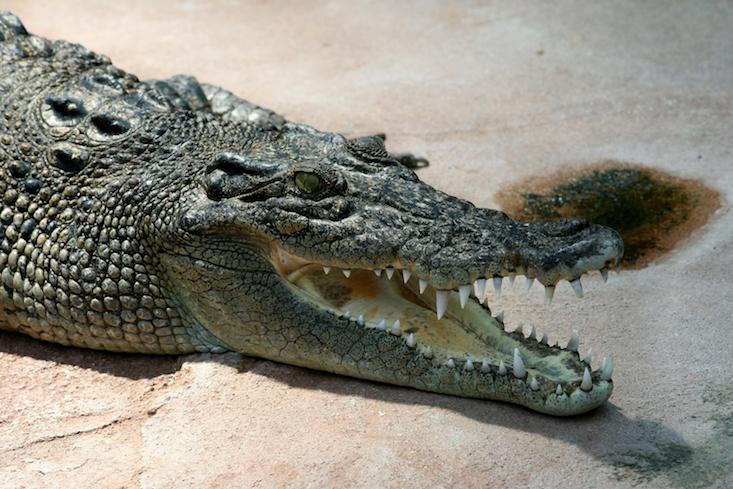In his Oscar acceptance speech, Leonardo DiCaprio said, “Making The Revenant was about man’s relationship to the natural world.” Perhaps the film’s most gripping illustration of this was when a grizzly bear nearly mauls DiCaprio’s character, an American fur trapper, to death. To be eaten by a predator, after all, may be the most apt display of man’s vulnerable state in nature. Onstage, DiCaprio evoked that vulnerable state, and made a forceful plea for global climate change action.
It turns out this isn’t the first time a near-fatal mauling has emboldened an environmentalist’s perspective. In 1985, the late philosopher Val Plumwood was nearly eaten by a saltwater crocodile. The harrowing experience inspired her to begin writing The Eye of the Crocodile, a series of essays posthumously published in 2012. In its first and most riveting piece, “Being Prey,” she explains how her critique of anthropocentrism—the idea that humans stand apart from nature—became palpable.
Plumwood was paddling through Australia’s Kakadu National Park in a 14-foot canoe in search of an Aboriginal rock art site. The hours passed, rain mounted, and she had found herself deep in a channel surrounded by steep mud banks and snags. When a sandy bar caused her to stop completely, she stepped out of the canoe and recalled how park owners had warned her of crocodiles hunting at the water’s edge. She paddled back into the main current and, rounding a bend, “saw in midstream what looked like a floating stick.” As the current moved Plumwood farther forward, “the stick developed eyes.” As the animal struck the canoe, she instinctively leapt onto the bank, into the lower branches of a paperbark tree. “But before my foot even tripped the first branch, I had a blurred, incredulous vision of great toothed jaws bursting from the water,” she writes.
The crocodile pulled Plumwood under and “death rolled” her three times—a maneuver the reptiles use to overpower and drown their prey. After the third roll, she felt a moment of the jaws relax and quickly jammed her fingers into the riverbank mud to clamber toward freedom. For the first time, she had a glimpse of her life from the outside—“a shockingly indifferent world in which I had no more significance than any other edible being.” She looked down at her resulting wounds, she writes. “The left thigh hung open, with bits of fat, tendon, and muscle showing.”

Two decades after the attack, in 2005, Robert Figueroa, an environmental philosopher at Oregon State University, visited Plumwood at her octagonal stone house outside of Canberra, Australia. (She died of a stroke in 2008.) He noticed that Plumwood’s home was full of crocodile paraphernalia. “Crocodile woman” is what some locals called her, Figueroa says. “People had sent her figurines and stuffed crocodiles.” She even had reptile-relevant quotes and newspaper headlines hanging like flags from the ceiling, apparently never wanting the significance of that encounter to fade. “She showed me that bite out of her leg,” Figueroa says. “It sort of wrapped around, matching the curvature of a jaw.”
Following that near-death encounter, Plumwood’s work shifted toward a focus on empathetic relationships. It echoed the philosopher Aldo Leopold’s “land ethic,” Figueroa says, which Leopold coined years after having a similarly profound moment with a wolf he had just shot. Figueroa recalls an instance of walking with Plumwood through the temperate rainforest surrounding her home. She halted mid-conversation when the lyrebirds sang or a bullfrog croaked “just to let them be heard,” he says. “It’s a meeting in the middle acknowledging that both of you have desires.”
Human rationality, Plumwood argued, has been portrayed as separate from, and taken more seriously than, emotions. This hierarchy, she said, supports a view of humanity as a masculine, domineering force over nature, which has no intrinsic value. By staunchly challenging that reasoning, she has become indispensable to modern environmental thought. J. Baird Callicott, who taught the world’s first environmental ethics course in 1971, was one of her admirers. He once confessed to slightly fearing her intellect and wrote, “She was the best philosopher in the community of environmental philosophers—the best among us in the twentieth century and so far the best in the twenty-first.”
Perhaps almost being eaten made her environmental convictions stand out as well. “We can talk about all of these things philosophically,” says Figueroa, “but it’s not until something happens to you that it actually becomes real.” Plumwood’s intimate relationship with the world is infectious, he says, “especially if you don’t see that person as just having a screw loose and you pay attention to how they interact.” For example, he says, she never had ants scouring the house because she left one sugar bowl in a bottom cupboard waiting for them, keeping them concentrated.
Seeing this sensitivity to the world, Figueroa says, had a lasting effect on him. Along with teaching Plumwood’s work in his classes at Oregon State, he sometimes now pauses his own conversations. “I tune into the sounds of birds and things out the window,” he says, “and I let them interrupt.”
Becca Cudmore is a journalist from Oregon. Her work has appeared in Audubon, The Scientist, Scientific American, Pacific Standard, and elsewhere. Follow her on Twitter @beccacudmore.






























